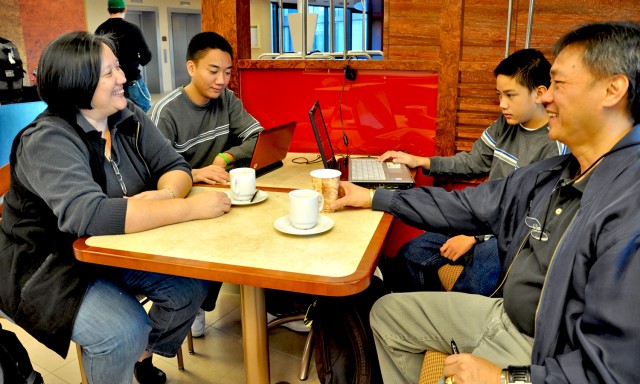WIESBADEN, Germany - As the world's television sets were tuned to the events in Cairo's Tahrir Square, members of an American family in Egypt wondered how it might impact their lives.
They soon found out as their neighbors began leaving the country on a voluntary basis and evacuation orders followed requiring all non-essential personnel to leave the country.
"We watched the news on television, listened to the radio and the Marines told us what was happening after the Egyptian government shut down access to the Internet," said Marina Del Castillo, who along with her husband Rogaciano and sons Tiga and Adam flew to Frankfurt International Airport via Istanbul, leaving everything but their essentials behind in their home in Maadi, a suburb of Cairo.
"You could see the escalation progressing," said Rogaciano, a quality assurance specialist with the Defense Contract Management Agency in Egypt, describing hearing sporadic gunfire which they later learned was by Egyptian military members shooting shots into the air to keep prisoners from escaping from a nearby prison.
Originally still able to go to work, Rogaciano said, "you got a kind of feeling" that something was in the works from the talk at work and embassy messages. "At the time, you're just hoping you don't have to go because you're leaving everything behind."
Despite a curfew which greatly restricted the movement of the international community living in Maadi, Marina said, "In between the curfew it was safe enough to go to the market."
"Basically, we just waited," said Rogaciano.
While members of the security forces and police left the area where the Del Castillos lived in leased housing during the demonstrations, they were replaced by Egyptian special operations forces who "took care of the place -- life was normal." There were also Egyptian tanks in place at the entrance to their neighborhood, Rogaciano said. "The local Egyptians created a neighborhood watch."
"When they put out the evacuation order it was voluntary at first, but soon became mandatory," said Marina. "The process involved was very good. ... We were well looked after by the State Department."
"We left everything behind," said Rogaciano, who has worked for the Defense Department for more than 24 years and came to Egypt in August 2010 to start his 12th tour overseas. "We were only allowed to take 44 pounds each."
Along with other members of the community being evacuated, the Del Castillos were bused to the Embassy Support Services Compound before heading to the Cairo Airport. "We could see tanks along the Suez Road," Rogaciano said.
Flights left for Cyprus, Istanbul and Athens before passengers transferred and continued on to Frankfurt, "the gateway" for processing people by the U.S. Embassy community.
The Del Castillos, who were temporarily residing in the new Wiesbaden Army Lodge while awaiting resettlement by the DCMA command, said they were impressed all along the journey out of Egypt by the support and reception they received. "The U.S. ambassador was right there by the door when we arrived in Istanbul," said Rogaciano, adding that members of his command and Col. Jeffrey Dill, U.S. Army Garrison Wiesbaden commander, also made the family feel welcome upon their arrival in Wiesbaden.
Now they are waiting to find out what comes next.
"I want to go home - I miss the school," said 10th-grader Tiga. "We just came off of winter vacation."
"The kids are communicating with all of their classmates over the Internet," said Marina, adding that the disruption to her children's education is the biggest challenge. "We're focusing on getting the kids in some form of schooling. Hopefully when everything settles down we can return home."
From friends - "other Americans who stayed and Americans married to Egyptians" - they have heard that things are settling down back in Cairo. "If you're not in the square, life is pretty much going on as usual," said Marina.
They've also been told that the international school the boys attended in Egypt has reopened.
Now the Del Castillos, like others who were forced to evacuate, are themselves watching events unfold in Egypt on television and through other media.
Their next move may be to Kuwait, Rogaciano said, where he can resume his duties with DCMA and the children can attend school before eventually heading back to their home in Egypt.
"As the kids say - you just go with the flow," he said.


Social Sharing